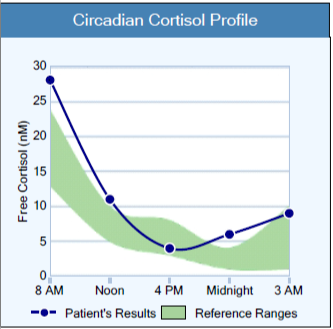
The New Expanded Adrenal Stress Index for Insomnia
Lack of sleep, defined as less than 7 hours per night, affects roughly one-third of US adults. Short sleep duration may have many consequences on human health and well-being, ranging from benign, such as decreased work performance, to more severe, including higher rates of heart disease and some cancers. Lack of sleep also increases the risk of premature mortality. According to research, individuals who sleep less than six hours each night have a tenfold greater risk of premature mortality than those who get seven to nine hours of sleep.1,2 Lack of sleep quantity and poor sleep quality may occur due to a variety of conditions, including insomnia.3
The American Academy of Sleep Medicine notes that insomnia symptoms occur in 35-50% of adults, and 5-15% have a chronic insomnia disorder. Insomnia is a complex diagnosis characterized by inadequate sleep due to difficulty with sleep onset or maintenance or a combination of both of these factors.3 Although multi-factorial in most cases, a hormonal component plays a role in many insomnia cases. Therefore, healthcare providers will ideally assess for endocrine imbalance in patients who suffer from this debilitating condition.4

Cortisol & Insomnia
One such disturbance is excess cortisol, which is released from the adrenal cortex and is responsible for the body’s response to environmental stressors. Among its many physiological and biochemical effects, cortisol increases blood sugar and mental alertness to prepare for fight or flight, increases blood pressure, and attenuates immune system function.4
In addition to rousing responses in the face of stress, cortisol plays a role in daily physiological cycles or diurnal rhythms. In the average adult, evening cortisol levels are low, falling to their lowest around midnight, and begin to increase around 4 AM, peaking in preparation for the day between approximately 7 – 9 AM.5-7
The effects of cortisol on increasing arousal are well known, and providers are increasingly testing cortisol levels during mid-sleep (post-midnight) waking periods when insomnia is of chief concern. Salivary cortisol testing at home is far more convenient when compared to a blood draw, especially in the middle of the night.
Salivary testing has been validated as a clinically useful and convenient way to test free and physiologically active cortisol at the tissue level.8,9 As the pioneer in clinical salivary hormone testing, DiagnosTechs has perfected salivary cortisol testing methods. Ease of patient collection, non-invasive protocols, and the accuracy of measuring the tissue-level free hormone are just a few of the benefits of saliva hormone testing.8

The Expanded Adrenal Stress Index Test Panel is Ideal for Patients with Insomnia
For the first time, DiagnosTechs now offers a diurnal cortisol measure specifically focused on insomnia – the Expanded Temporal Adrenal Profile (TAP-5). This panel will expand upon the standard four measures of cortisol (AM, Noon, Afternoon, Bedtime) with the addition of a fifth cortisol measurement between 2 – 4 AM (Post-Midnight). The additional post-midnight saliva test assists in determining if a cortisol spike is related to their insomnia.
This new Expanded Temporal Adrenal Profile is available on its own (TAP-5), as an Expanded Custom Adrenal Stress Index (NLASI-5), and also as a component of our new and more comprehensive Expanded Adrenal Stress Index (AASI-5).
Our new Expanded Adrenal Stress panels unlock the mystery of overnight cortisol levels for patients with chronic or acute insomnia. If a spike in cortisol is found and thought to contribute to insomnia symptoms, a clinically effective treatment protocol that targets the underlying cause to decrease or counteract excessive cortisol production could resolve the insomnia. Lifestyle, diet, and supplement changes are commonly prescribed and may be comparable to treating cortisol imbalances during the day.
In addition to the new TAP-5, NLASI-5, and AASI-5 panels, the individual Post-Midnight cortisol test (TAP5) is available to order through DiagnosTechs’ convenient and customizable Expanded Flexi-Matrix test kits.

Order the New Expanded Adrenal Stress Index Test Today!
To order test kits, click here. DiagnosTechs will drop ship test kits directly to your patients, and you may select this option at the top of the order form.
Please log in to your Provider Portal to access Provider Tools and explore the links under Adrenal Stress to learn more about our Adrenal Stress testing and Naturopathic Treatment Options to Address High Cortisol Levels.
 References:
References:
- Chattu VK, Manzar MD, Kumary S, et al. The Global Problem of Insufficient Sleep and Its Serious Public Health Implications. Healthcare (Basel). 2018;7(1):1. doi:10.3390/healthcare7010001
- FASTSTATS: Sleep in adults. Centers for Disease Control and Prevention. May 5, 2024. Accessed April 28, 2025. https://www.cdc.gov/sleep/data-research/facts-stats/adults-sleep-facts-and-stats.html.
- Edinger JD, Arnedt JT, Bertisch SM, et al. Behavioral and psychological treatments for chronic insomnia disorder in adults: an American Academy of Sleep Medicine systematic review, meta-analysis, and GRADE assessment. J Clin Sleep Med. 2021;17(2):263-298. doi:10.5664/jcsm.8988
- Liu PY, Reddy RT. Sleep, testosterone and cortisol balance, and ageing men. Rev Endocr Metab Disord. 2022;23(6):1323-1339. doi:10.1007/s11154-022-09755-4
- De Sanctis V, Soliman A, Yassin M, et al. Cortisol levels in central adrenal insufficiency: light and shade. Pediatr Endocrinol Rev. 2015;12(3):283-289.
- Abell JG, Shipley MJ, Ferrie JE, et al. Recurrent short sleep, chronic insomnia symptoms and salivary cortisol: A 10-year follow-up in the Whitehall II study. Psychoneuroendocrinology. 2016;68:91-99. doi:10.1016/j.psyneuen.2016.02.021
- Selmaoui B, Touitou Y. Reproducibility of the circadian rhythms of serum cortisol and melatonin in healthy subjects: a study of three different 24-h cycles over six weeks. Life Sci. 2003;73(26):3339-3349. doi:10.1016/j.lfs.2003.05.007
- Bozovic D, Racic M, Ivkovic N. Salivary cortisol levels as a biological marker of stress reaction. Med Arch. 2013;67(5):374-377. doi:10.5455/medarh.2013.67.374-377
- Raff H, Raff JL, Findling JW. Late-night salivary cortisol as a screening test for Cushing’s syndrome. J Clin Endocrinol Metab. 1998;83(8):2681-2686. doi:10.1210/jcem.83.8.4936


